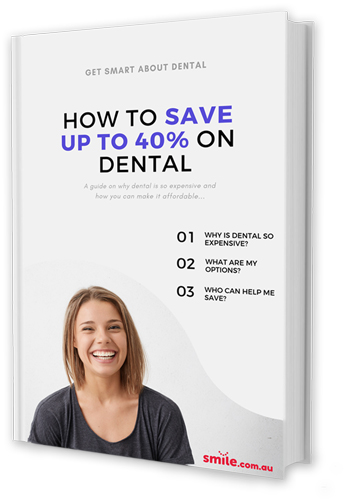Dental Phobia, Dental Fear, Dental Anxiety
Reviewed June 2024 by Our Content Experts
Dental phobia is the serious often paralysing fear of seeking dental care. It has been reliably reported that many Australians do not seek regular dental care due to anxiety and fear surrounding the dental experience. This can have serious ramifications for your dental health and overall well-being.
Besides chronically infected gums and teeth which can affect your medical status, your ability to chew and digest can be seriously compromised. Without healthy gums and teeth, your speech can be affected as well. Your self confidence can also be compromised if you are insecure about your breath and smile. This can lead to serious limitations in both your social and business environments.
Dental anxiety self-test
Answering yes to any of the questions below may signify that you have some form of dental anxiety. It is important to note that many new, wonderful products and procedures are available that can make the dental visit a pleasant experience.
- Do you feel nervous about the visit while waiting in the reception area of the dental practice?
- Do you feel slight uneasiness and tension the evening prior to your dental visit which makes you cancel your dental appointment?
- Do you feel uneasy and anxious while in the dental chair?
- Have you had a prior dental experience that was unpleasant?
- Does seeing the dentist or dental hygienist's instruments make you anxious?
- Does the thought of having a dental injection make you feel physically ill and tense?
- Do objects placed in your mouth during the dental visit make you panic and feel like you can not breathe correctly?
- Do you feel embarrassed that the dentist will say you have the worst mouth they have ever seen?
- Do you feel that your dentist is unsympathetic only with you?
Why do I fear the dentist?
Dental phobias and anxiety stem from various sources. These can lead to a strongly conditioned fear response. Below is a list of the most common origins of dental fear.
- A severe discomfort with feeling helpless and out of control in the dental situation.
- Previously painful or negative experiences during visits to a dental practice. This can even include careless comments made by a dentist or hygienist during a past examination.
- Scary anecdotes of dental experiences learned from family and friends.
- A sense of embarrassment and fear of ridicule for your dental neglect when visiting a dental practice.
- A sense of depersonalization in the dental process, intensified by today's necessity for the use of barrier precautions, such as masks, latex gloves and shields.
- Negative, menacing portrayals of dentists in movies, TV, newspapers and magazines.
- A general fear of the unknown.
What can I do about my dental fear?
- Dental fear can be overcome.
The first thing you can do is to realise that your dental fear can be overcome. Fear is a learned behaviour which can be unlearned. Patient-centered behaviour modification that treats you as a whole person not as a set of teeth can help you overcome your fears. This will take a team approach between you and your dentist and their staff. - The right dentist and dental staff.
You must feel comfortable expressing your fears and concerns and have a sense that they are listening to you. Modern dentistry with a compassionate dental team can be truly painless. You can desensitise yourself to your fears if you take the first step and allow the right team to help you overcome your fears. If you feel that the dentist and staff are not genuinely concerned and listening then seek out referrals to other practices. - Dont be embarrassed.
If you have been ridiculed in the past for your behavior or if you are embarrassed by your present dental condition caused by your neglect then express yourself honestly and give your present dentist a chance to understand your concerns and show you that they care. You will be amazed at the wealth of treatment options that you might not have thought were possible. It's never too late to recreate a new smile with modern dentistry. - Educate yourself.
Empower yourself with knowledge to alleviate the fear of the unknown. Explanation and clarification of any and all procedures proposed is your right as a patient. If you have a question about a particular procedure, ask it! Conduct your own research within books, brochures or the internet. You should also have input into treatment decisions and choices. - Effective communication.
You should never compromise the level of communication that you feel is necessary to give you a sense of control over your situation in the dental practice. You should be honest with your dentist regarding how much treatment you think you can tolerate at first. The length of your appointment and the amount of work accomplished will increase as you build confidence in yourself and trust in the team that is caring for you.
A Signaling System could be established allowing you to stop for any reason. You may wish to stop for more anaesthesia, a desire to rinse out, or simply because you need a short break. The most common signal is raising your hand. - Relaxation techniques.
If you feel tense in the chair, the easiest way to relax is through forms of physical relaxation. A relaxed body assists with placing your mind at ease. The human body can not be physically relaxed and mentally anxious at the same time. Try practising some physical relaxation methods.
Examples of physical relaxation are Diaphragmatic Breathing, Progressive Muscle Relaxation, and various methods taught in yoga. There are numerous books and sources for these methods. If you induce relaxation in the presence of the stimuli that normally induces your fears (i.e. the dental environment), the fear response will be greatly diminished over multiple exposures and you will gradually desensitise yourself to these fears as you build confidence. The memories of traumatic visits will be replaced with more innocuous ones and this less threatening environment coupled with your relaxation methods will help you eliminate your fears. - Predictable Pain Control.
Modern dentistry has many new techniques with regards to the administration of local anaesthetics to block any possibility of pain. There are many people who have anatomical or biological variations that do require more individual techniques in order to predictably achieve proper local anaesthesia. This variation should be communicated to your dentist.
All injections should be given slowly. The needle itself is not the major cause of discomfort, but in fact, it is the pressure and volume of the fluids being injected that causes the discomfort. There are also great differences in the types of tissue in various locations, anatomically and from person to person, that must be considered when administering injections.
Oral medications such as a valium, or something similar, can be used to help you relax and feel more comfortable during long procedures. nitrous oxide (sweet air, laughing gas) also provides pain relief and distraction. A discussion regarding predictable pain control options with your dentist would be helpful when choosing the best option for you. - Distraction.
As you get more comfortable in the dental environment, you can engage in various distraction techniques that some dental practices have on hand. The use music or podcasts with headphones is a common technique. We only suggest using distraction techniques once you have established some trust and confidence as your ability to communicate will be compromised.

